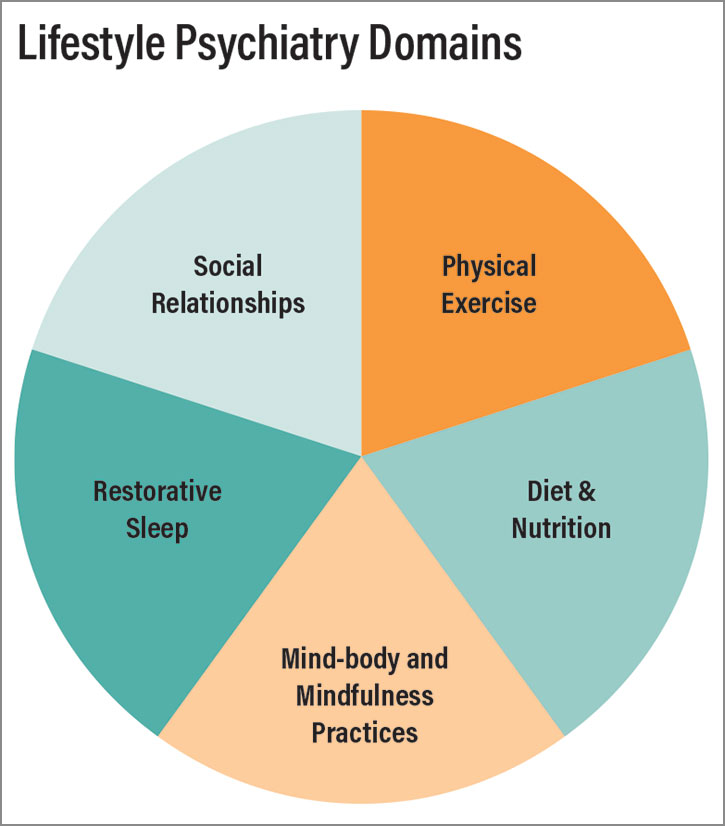The United States has the most expensive health care system in the world, yet the life expectancy of the population lags far behind that of other developed countries. While there are many plausible explanations for the disparity between health spending and health quality, there is no doubt that even the world’s most advanced health system cannot compensate for poor lifestyle factors that have become far too common in this country.
We know that lifestyle factors are correlated with the prevalence, onset, and perpetuation of psychiatric symptoms and syndromes. For instance, it is quite common to hear transition-age youth and young adults describe trying to soothe their mind by watching videos in bed at night, which unfortunately exposes them to excessive screen time and disrupts their sleep cycles. Among adults, sedentary behavior—which has increased in recent years—has been correlated with an increased risk for suicidal behavior, depression, cognitive decline associated with aging, and psychosis. These trends point to the importance of careful assessment of the role of lifestyle factors in the mental and physical health of people who present to us for care. We also need to educate our patients about the impact of their lifestyle choices on their health and well-being and guide them to make positive lifestyle choices.
Psychiatrists are uniquely positioned to consider medical, psychosocial, and lifestyle contributors to the onset of a psychiatric disorder. We have the capacity to bring expertise in psychopharmacology, psychotherapy, and lifestyle interventions to the development of effective treatment planning. Pharmacologic interventions typically have more rapid onset of effects than lifestyle interventions and can pave the way for a person to garner the motivation, energy, and organization to build positive lifestyle behaviors in their lives. We also bring expertise in effective behavior change strategies. Some patients may approach care with a strong interest in using lifestyle interventions, while others may prefer to start with traditional psychiatric treatments and develop interest only after adequate education. Patients may have cost or access barriers to traditional care, and lifestyle interventions may be especially appealing to patients who place great value in self-determination.
Lifestyle interventions may be useful for primary prevention, first-line therapy, multimodal therapy, augmentation, precision therapy, and relapse prevention, depending on the presentation. Requests to reduce pharmacotherapy or psychotherapy interventions represent an ideal time to introduce the value of adopting positive lifestyle behaviors to manage symptoms, reduce reliance on other modalities of treatment, and reduce the risk of relapse.
Lifestyle interventions inherently involve increased patient responsibility and ownership of their recovery process. Focusing on lifestyle behaviors can facilitate a transition to self-directed care and reduce the need for professional services.
Evidence Grows Regarding Lifestyle Choices
The evidence base supporting lifestyle interventions to not only support but also improve mental and brain health has grown dramatically in recent years. The domains of Lifestyle Psychiatry include physical exercise, diet and nutrition, mindfulness and meditation, mind-body practices, restorative sleep, and social relationships. In this section, we will summarize some prominent findings to give readers a taste of the richness of the data that indicate the role each domain can play in effective treatment.
Physical exercise
A robust body of evidence supports the therapeutic benefits of exercise across various psychiatric conditions. In depression, we know that exercise consistently proves effective, reducing symptoms and achieving significant response and remission rates both as a primary therapy and as an adjunct when patients have an inadequate response to medication therapy. Response rates typically parallel those of selective serotonin reuptake inhibitors. Meta-analyses in anxiety reveal exercise significantly diminishes symptoms, with specific modalities like resistance training and qigong showing efficacy. For
schizophrenia patients, exercise has been shown to improve negative and mood symptoms; enhance global cognition; and confer neuroanatomic benefits, including brain volume restoration and increased metabolism in specific regions.
Exercise can also be used in the treatment of posttraumatic stress disorder (PTSD). A
2014 study in
Cognitive Behaviour Therapy found that a two-week stationary biking exercise program reduced symptoms of PTSD in conjunction with other therapy, and a 2020
review and meta-analysis in
Military Medicine has now confirmed that exercise is effective in reducing the severity of PTSD symptoms. Additionally, exercising prior to psychotherapy sessions may improve treatment response, particularly in
prolonged exposure therapy for PTSD. Other research has found that exercise benefits aging populations and prevents cognitive decline. Promising results are emerging for the possible benefit of exercise in attention-deficit/hyperactivity disorder, autism spectrum disorder, and substance use disorders.
There are many mechanisms by which exercise promotes mental health. Exercise upregulates neurotransmitters and neurotrophic factors associated with positive mood and neuronal vitality. Exercise increases neurotrophins, such as brain-derived neurotrophic factor (BDNF), which supports neurogenesis, synaptic proliferation, and enhanced cognitive function. Finally, regular exercise positively impacts cognitive function and increases neuroplasticity that can enhance learning and adaptation.
Exercise “snacks,” or
brief episodes of exercise interspersed throughout the day, are a promising new approach that can be added to concentrated daily exercise. Exercise snacks may be a healthy alternative to food snacks or a caffeinated beverage. We advise our patients who struggle with sustained attention in sedentary tasks to stand up and do a set of pushups or climb a flight of stairs every 30 to 60 minutes. Many patients report that two- to three-minute exercise snacks improve their attention and productivity.
Diet and nutrition
Food is medicine, and research underscores the significant impact of healthy, nutrient-rich diets on mental health. A focus on whole foods, particularly vegetables, fruits, beans, unprocessed grains, nuts, seeds, olive oil, and fish, has demonstrated positive effects on mental health. Conversely, diets abundant in processed foods, artificial ingredients, refined grains, and excessive sugar intake have been associated with worse mental health outcomes.
A 2018 meta-analysis by Camille Lassale and colleagues in
Molecular Psychiatry revealed that adopting healthy dietary patterns significantly reduces the risk of depression. The Mediterranean diet, rich in vegetables, fruits, nuts, and legumes and moderate in poultry, eggs, and dairy with occasional red meat consumption, stands out. While research is unearthing the intricate biological mechanisms linking diet to mood, it is believed that components of the Mediterranean diet like fiber, polyphenols, and polyunsaturated fats (such as omega-3 fatty acids) may foster gut biome diversity. This is thought to facilitate improved metabolism of food into anti-inflammatory metabolites, potentially attenuating cytokine-induced depression. Additionally, emerging evidence points to the modulation of cellular oxidative processes and the neuroprotective effects of certain nutrients as potential mechanisms through which food influences mental health more broadly.
A growing body of evidence supports the use of nutraceuticals in treating various psychiatric disorders. Noteworthy examples include N-acetylcysteine, with its neuroprotective effects showing promise in addressing negative symptoms of schizophrenia. Adjuvant EPA-rich omega-3 fatty acids and zinc may offer benefits in improving depressive symptoms, while branched-chain amino acids could potentially reduce acute mania symptoms in bipolar spectrum disorders.
Mind-body and mindfulness practices
Yoga, tai chi, and meditation are garnering increasing attention and evidence in their benefits in promoting well-being, reducing stress, and as an intervention for a variety of mental health conditions. In its more comprehensive forms, yoga extends beyond postures to include practices such as breathwork and meditation as well as lifestyle and value-based practices. A
2019 meta-analysis by Jacinta Brinsley and colleagues in the
British Journal of Sports Medicine showed that yoga led to reductions in depressive symptoms in a dose-dependent manner across conditions such as schizophrenia, bipolar, and anxiety disorders.
A 2019 study in
JAMA Neurology by Jojo Y.Y. Kwok and colleagues comparing mindful yoga with conventional stretching and resistance training exercises for people with Parkinson’s disease found that both had comparable benefits for motor dysfunction and mobility, yet only yoga conferred additional benefits for reducing anxiety and depressive symptoms.
Breathwork, which involves the conscious control of breathing, has recently been gaining a surge in interest and research as a distinct intervention. Breathwork practices have been shown to be associated with reduced levels of stress and improvement in anxiety and depressive symptoms.
Mindfulness-based interventions
Mindfulness-based stress reduction (MBSR) and mindfulness-based cognitive therapy (MBCT) have well-established therapeutic benefit. An MBSR program was found to have comparable effectiveness to escitalopram for the treatment of generalized anxiety disorder. MBCT has strong evidence for reducing the risk of relapse of depression, comparable to maintenance antidepressant medication. While evidence is still emerging and gaps in the literature need to be addressed, mind-body practices show promise for a variety of psychiatric conditions.
Mind-body practices are beneficial through a variety of mechanisms. One includes bidirectional pathways between brain and body that lead to regulation of the autonomic nervous system and hypothalamic pituitary axis activity. We know that mind-body practices can result in changes to physiological markers and neurotransmitters implicated in stress and psychiatric disorders such as heart rate variability, inflammatory cytokines, cortisol, and GABA. There is also impressive literature demonstrating robust brain functional and structural responses to meditation practices. Research shows significant changes in areas such as fronto-limbic pathways involved in emotion regulation and stress and areas such as the default mode network involved in self-referential processing and present moment awareness. These changes may be associated with greater ability for attention, self-awareness, and self-regulation. Mind-body practices may also encourage social connection and community building based on their modes of delivery, including community yoga classes or group meditation programs.
Restorative sleep
Sleep and mental health are inextricably intertwined. Sleep disturbance is so common a symptom of psychiatric disorders that it is part of the diagnostic criteria for depression, bipolar disorder, anxiety, and PTSD, and it is a comorbidity in schizophrenia, obsessive-compulsive disorder, borderline personality disorder, suicide, alcohol use disorder, and others. A disorder of the brain affects people in both waking and sleeping states, and sleep disturbance is both a symptom and an etiological factor in psychiatric disorders. Individuals with insomnia have up to 40 times greater odds of developing new onset major depression within one year, and sleep difficulty is a stronger predictor of major depression than sadness, weight changes, fatigue, psychomotor retardation, concentration difficulties, and even thoughts of suicide.
Reduced sleep is a common precursor to hypomania/mania in people with bipolar disorder, and cognitive-behavioral therapy for insomnia can significantly reduce risk for a manic episode by restoring sleep patterns. A
2018 study in
BMC Psychiatry has shown that insomnia increased the risk of suicide 3.5-fold compared with patients without insomnia. Sleep deprivation is also associated with poorer cognitive performance and poorer athletic performance. Sleeping less than six hours a night was recently correlated with increased risk for major neurocognitive disorders.
Sleep deprivation can develop in various ways. One of the most common and modifiable causes is restricted sleep opportunity. Many people stay up beyond their circadian window for sleep onset due to distraction by screens or gaming. Others have difficulty falling asleep due to persistent thoughts and worries. Helping people create a consistent routine for calming their body and mind to prepare for sleep can improve sleep onset. Maintaining a consistent waking time can strengthen the circadian rhythm. Sleep hygiene techniques can improve the sleep environment to support restorative sleep of adequate quality and duration.
Social relationships
Improving the quantity and quality of social connections is important in the prevention and management of psychiatric conditions. It has been consistently demonstrated that individuals with limited social support experience poorer outcomes in both physical and mental health. In fact, social isolation may pose health risks equivalent to smoking, hypertension, and obesity. Studies have found that diminished social networks, a scarcity of close relationships, and a perceived lack of social support are correlated with depressive symptoms, and social network size is inversely correlated with psychopathology and negative symptoms in schizophrenia-spectrum psychotic disorders.
On a brighter note, decades of research have firmly established a positive and causal connection between social support and physical health, mental health, and longevity. This concept is substantiated by evidence showing that psychosocial rehabilitation interventions play a pivotal role in enhancing function and alleviating symptoms in conditions such as bipolar disorder and schizophrenia.
While the precise mechanisms through which social connections enhance mental health remain incompletely understood, we know social connections affect everything from neurobiological pathways to psychological resilience. The fundamental bond between mother and infant sets their attachment style and mental health trajectory through life. Moreover, this bond is entwined with the production of oxytocin, a hormone found to reduce stress levels. Social connections have also been theorized to buffer against the adverse physical and mental health impacts of stress by providing active coping mechanisms and emotional support. Additionally, the positive psychological states fostered by social connections, such as a sense of belonging, security, self-worth, self-esteem, and purpose, have been thought to link to motivation for self-care. In turn, these positive states are believed to modulate further neuroendocrine responses to stress. In essence, creating and maintaining social connections not only aid in preventing and alleviating psychiatric symptoms but also contribute to a broader enhancement of psychological well-being and health.
Responding to Contemporary Challenges
Unfortunately, the society in which we live continues to shape our behavior in unhealthy ways. Sedentary time continues to rise in parallel with increases in substance use, suicide, and emergency room visits for mental health care. Traditional diets are progressively being displaced by processed foods. Twenty-four-hour virtual experiences constrain sleep opportunity, and social interaction is increasingly impersonal. Global health care systems are stressed by escalating rates of lifestyle-related disorders including diabetes mellitus type 2, cardiovascular disease, cancer, depression, and addiction.
Lifestyle Psychiatry offers a unique opportunity for psychiatrists to lead other medical disciplines in promoting attention to the impact of lifestyle on health and disease. When clearly identified, the potential dual benefit for mental and physical health may enhance motivation to adhere to positive lifestyle changes. There is an urgent need for psychiatry to step forward to assist governments, employers, corporations, health care systems, and others to effectively position practices that promote a healthy lifestyle to address the rising tide of distress, disability, and loss of life flowing from modern cultural trends in a global society. We must articulate the strength of the current evidence on the impact of lifestyle behaviors on mental and physical health outcomes while identifying areas in which further evidence is needed to offset these unhealthy societal trends on human health. Further, we must ensure that advocacy to forward Lifestyle Psychiatry reflects broader systemic factors. Social determinants of health, which are undeniably intertwined with lifestyle, can disproportionately increase lifestyle-related risk factors and health disparities, particularly for marginalized and underserved communities. For example, individuals of lower income and racialized communities disproportionately live in food deserts, areas where there is limited access to affordable nutritious foods. It is therefore imperative to consider and address the complex systemic factors that may limit accessibility and adoption of positive lifestyle change.
An important challenge is to understand the mechanisms driving the down-regulation of our brains in response to sedentary behavior, stress, inadequate sleep, and poor nutrition and up-regulation in response to physical activity, whole foods, restorative sleep, and loving social relationships. There is evidence pointing to evolutionary forces and epigenetic changes in response to positive lifestyle behaviors that underlie improved brain health and function. For example, histone modifications and DNA methylation increase activity in genes coding for the transcription of BDNF in response to sustained physical exercise. Our brains appear to be programmed to thrive under healthy circumstances and to withdraw during adversity, perhaps to conserve energy or protect against negative impact. Articulating how and why we are wired to respond to our lifestyle will be crucial to public education about the importance of self-care to improve and support mental health and well-being.
We are building a new program at Stanford University to take on this challenge. The
Stanford Lifestyle & Sports Psychiatry initiative aims to develop awareness of Lifestyle Psychiatry as a vital component in improving the health and well-being of people around the world. We will provide consultation and leadership to governments, corporations, and health care systems to help them take advantage of the evidence of the powerful role of Lifestyle Psychiatry. We also aim to inform public education programs and community planners to support the creation of healthy communities, employers in creating healthy workplaces, and individuals in taking ownership of their mental health and well-being. ■



